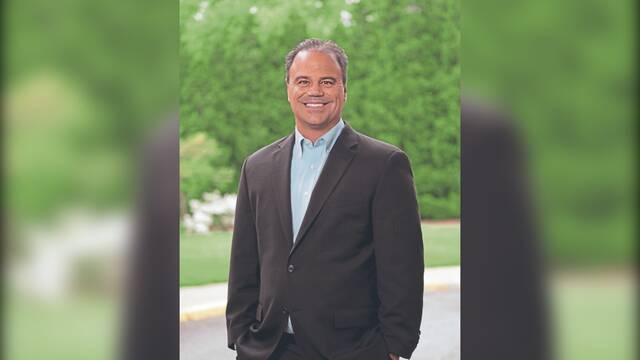Sewickley Heights officials reluctantly released terms of a new employment contract with police Chief James Harrison.
Council unanimously approved the new three-year deal Oct. 21.
Mayor George Magovern and council president John Means recommended the contract approval.
Borough manager Nathan Briggs said council and the chief “refreshed” the employment contract “as a routine matter, following changes in elected officials in the past two years.”
He said no significant changes were made and it was merely an opportunity to update the terms.
When pressed for more information about the contract in late October, Briggs said it was not his place to discuss the contract and declined to disclose financial terms out of respect for the chief.
“It wasn’t my contract to discuss,” Briggs said. “He negotiated that with council. I wasn’t part of the negotiations, so it was his.”
The manager also said salaries are personal information.
TribLive submitted a Right-to-Known request to obtain a copy of the contract on Oct. 28.
The borough responded with the information on Nov. 4.
Melissa Melewsky, media law counsel for the Pennsylvania NewsMedia Association, said the borough complied with the Sunshine Act by releasing the information as requested, but it was an unnecessary step.
“That’s creating an unnecessary delay for the person seeking the information and it’s also creating unnecessary work for people in the agency,” she said. “Public money is funding whoever has to deal with the Right-to-Know Law request.
“These are simple answerable questions in a phone call. There’s no reason to make an employee at that agency spend x number of hours responding to a Right-to-Know Law request. This is clearly public information. It’s not private. There’s nothing private about it. The law is extremely clear. … There’s nothing private about a publicly funded salary. Nothing. There’s no privacy interest there.”
Melewsky said she understands how people would believe salaries are personal and not be the one to disclose such information, but those feelings do not apply to government jobs.
“When the taxpayers foot the bill, the taxpayers have a right to know what they’re paying for and who’s being paid and how much,” she said. “I understand in the nongovernmental world that is an expectation that exists in the community. That is not a reasonable expectation when it comes to publicly funded salaries — it just isn’t.”
Municipalities have five business days to respond to an RTK request from the date it was received and Melewsky said the clock starts on the business day following the day they get the request. The municipality must either approve or deny the request or inform the requester of a legal review that may take up to 30 calendar days, according to the law.
If the request is denied, the municipality must provide its reason for denial and explain how to appeal the decision.
If a legal review is announced, and there is no correspondence after 30 days, the request is deemed denied, Melewsky said.
Appeals of RTK denials from government agencies, especially ones about finances, go to the state’s Office of Open Records.
Changes in elected officials
Republicans Tom McCargo, Means and Michael Bollinger won three council seats in last year’s election, according to the Allegheny County Elections Division.
Phil Hundley, who won council seat in 2021, resigned last year and was replaced by Mary Babour.
Republican John Oliver ran unopposed for mayor in 2021. He resigned in September 2023 and was replaced by Magovern.
Contract details
Harrison’s salary this year is $132,177, according to the contract, which is set to expire at the end of 2027.
Under the collective bargaining agreement, the chief will receive a minimum annual salary increase “equal on a percentage basis to that received by full-time patrol officers.”
The contract does not numerically state the percentage.
It does, however, state borough officials may provide an even greater unspecified salary increase than that percentage at their discretion.
Harrison declined an interview and did not return multiple phone calls seeking comment.
Means released a statement about the contract.
“The mayor and borough council were pleased to solidify the updated agreement with Chief Harrison,” Means said. “Everyone is pleased with his performance and look forward to his continued leadership. Chief has served the borough for over 20 years, with 7 of those years as Chief of Police.”
Magovern, via Briggs, said he supports Means’ statement and declined an interview.
Other council members did not respond to requests for comment.
Reaching borough officials
Contact information for the mayor and council is not posted on the borough website.
There are no direct phone lines, extensions or emails to the elected officials of the borough with an annual budget of about $2.89 million.
The manager said all requests go through the borough office.
Briggs said any message for the mayor or council gets forwarded to them. He declined to provide any contact information for the mayor or council members, stating that was personal information.
Sewickley Heights is far from the only Allegheny County borough or Quaker Valley area community to operate like this.
Edgeworth and Glen Osborne have no direct lines or emails to their councils posted on their respective borough websites. However, email addresses of council members have been provided upon request.
Sewickley and Aleppo provide email addresses to their council members and township commissioners, respectively. Phone calls go through the main office line.
Leetsdale has phone numbers and email addresses for its council members. Some use the borough office phone line as well as provide personal numbers.
Melewsky said not providing a direct means of communication to elected leaders is not against the law, but can be a major inconvenience for their constituents and others.
“It’s not a legal issue, but I think it’s a transparency and public trust issue,” Melewsky said. “These are elected officials. The public should have a way to reach them in a reasonable manner. I’m not suggesting that they hand out their own home telephone number (or) for their cell phone that’s in their back pocket at all points in time, but it does seem like there should be a better way to contact them.
“It’s not difficult to create an email address for an individual or several individuals. I can almost guarantee that the municipality has that capability for an email address. Same with a phone number — even if they’re not sitting at that desk during the day.
“There’s a way that there can be a phone number that people can call and leave a message and public officials can check so the public and the press doesn’t have to be routed through five or six different people in order to reach public officials. Responsiveness is part of governance.”
Briggs said creating a borough email address costs money and is “not a great use of taxpayer dollars.”








